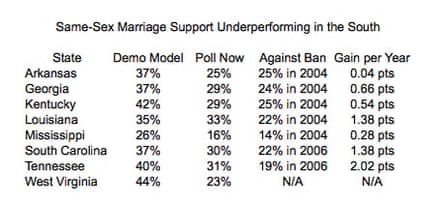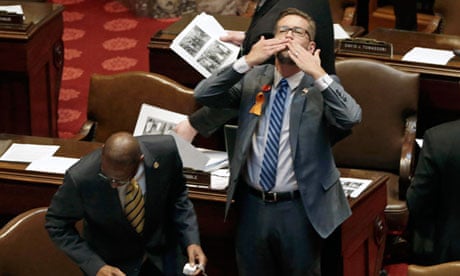The gay marriage movement is racing forward faster than ever, and with a new burst of life. This week, Minnesota became the third state to pass same-sex marriage this year, and the twelfth state overall, but most surprisingly, this was a state that, according to polls, was willing to constitutionally ban same-sex marriage a year ago.
Minnesota won't be the last state to make do a quick turnaround. National polling indicates that the majority support for same-sex marriage is picking up by 2pt per year. Among states, gay marriage is popular in California, New Jersey, Pennsylvania and many others.
Indeed, demographic models indicate that if put up for a vote, same-sex marriage would become legal in all but six states by 2020! Even Mississippi is projected to be up to near 40% support on the issue, gaining a little over 1.5pt per year. So the whole thing should be over soon, right? Not likely.
Unless the federal government or supreme court acts, it could take years and years for many southern states to legalize same-sex marriage.
As Nate Cohn notes, there's reason to believe that the demographic models are off in the south. The south has a far higher percentage of white evangelicals than any other part of the country, and these voters have been very slow to change their views. The great majority of young, white evangelicals still oppose gay marriage, unlike other young voters.
State polls show a number of southern states running behind where the demographic models indicate where they should be.

Indeed, some states have shown very virtually no change since they approved constitutional amendments against same-sex marriage. At the rate Arkansas is moving, it will take more than 20 or even 30 years for the majority of voters to be in favor of same-sex marriage. In Kentucky, only 30% of voters 18-29-years-old are in favor of gay marriage.
The problem, however, is not just that it will take a while for a majority of voters to support same-sex marriage. All the southern states except for West Virginia have a constitutional ban against same-sex marriage, which requires an amendment to repeal the previous one. The process for doing so in many southern states requires a majority in the state legislature, which is to say that voters can't just petition to get something on the ballot.
Alabama, Georgia, Kentucky, Louisiana, North Carolina, South Carolina, Tennessee, Texas and Virginia can only get an amendment on the ballot with approval from the state legislature. West Virginia doesn't allow referendums or initiatives to be voted upon, so it has to start in the legislature there, as well. Only Arkansas and Mississippi let voters directly pass a constitutional amendment.
The states that require legislature approval have very stringent rules, too: either a constitutional convention can be called, which is almost impossible, or the legislature can pass the amendment before sending it to the voters.
Alabama, Kentucky and North Carolina require +60% of each chamber of the state legislature to approve an amendment, just to get it on the ballot. A simple majority of voters must then approve. Right now, Republicans control over 60% of the seats in at least one chamber of all these state legislatures.
Georgia, Louisiana, South Carolina and Texas require two-thirds of each chamber to approve an amendment for the ballot. Then, the amendments need a majority vote from the people. Republicans control over 55% of each house of these states.
Tennessee and Virginia require a majority of each chamber of the legislature in one session, then it must be voted upon again by the next legislature, which means an entire election must go by. In Tennessee, two-thirds of each house must then approve for it to be placed for a majority vote of the people; Virginia only needs a majority. Tennessee Republicans control 70% of each state chamber. Virginia Republicans hold two-thirds of the seats in Virginia.
The bottom line is that with the exception of Arkansas, Mississippi and Virginia, any southern state with a ban in place would need at least 60% each of their state houses to reverse the ban. Republicans have at least partial control of all the legislatures near the border and in the deep south. Many of these states were won over recently, as the last remnants of the Yellow Dog Democrats bit the dust. Change seems rather unlikely, except perhaps for peripheral states, like North Carolina and Virginia. The only one that isn't Republican controlled, West Virginia, is so conservative that Joe Manchin, one of only two Democratic US senators who doesn't personally support gay marriage, calls it home.
Republican control is a big deal because though the rest of the country has moved, Republicans, especially southern Republicans, have not. Only 26% of Republicans support gay marriage. The percentage of Americans in favor of same-sex marriage rose by 15pt over the past decade; the percentage of Republicans favoring gay marriage only rose by 3pt over the same period. That's a growth rate of only 0.3pt a year.
Specific state polling is no more comforting to those looking forward to change. Support for same-sex marriage in these states is as follows: 10% of Georgia Republicans, 11% of Louisiana Republicans, 12% of Kentucky Republicans, 12% of North Carolina Republicans, 9% of South Carolina Republicans, 14% of Texas Republicans, and a quarter of Virginia Republicans.
With the exception of Virginia, it's pretty clear that southern Republican support for gay marriage is lower than among Republicans nationally. As such, it's difficult to see how support among southern Republicans will hit 50% anytime before 2040. It's hard to imagine more than the stray Republican voting for same-sex marriage. Polarization is at all-time high, and politicians are more afraid about losing primaries than general elections. Republicans have no need to vote for same-sex marriage.
Thus, unless the federal government jumps in, most, if not all southern states won't legalize same-sex marriage for the foreseeable future. Most of their citizens don't want it, and by the time they do, most Republicans still won't. Considering you'll need a majority or supermajority of state legislators to get the bans reversed, and that Republicans have a strong hold over these chambers, same-sex marriage in the south doesn't have much of a chance anytime soon.
